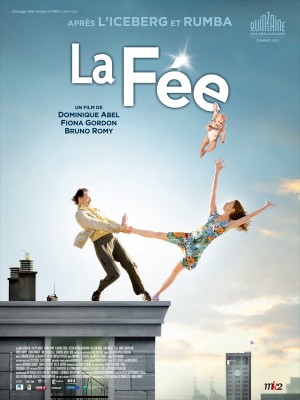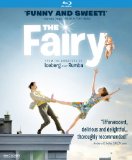| Reviews & Columns |
|
Reviews DVD TV on DVD Blu-ray 4K UHD International DVDs In Theaters Reviews by Studio Video Games Features Collector Series DVDs Easter Egg Database Interviews DVD Talk Radio Feature Articles Columns Anime Talk DVD Savant Horror DVDs The M.O.D. Squad Art House HD Talk Silent DVD
|
DVD Talk Forum |
|
|
| Resources |
|
DVD Price Search Customer Service #'s RCE Info Links |
|
Columns
|
|
|
Fairy (La fée), The
Another compliment is that while the film has some French dialogue, it's overwhelmingly visual and so much in the tradition of silent and early talkie comedy that one could easily turn off the English subtitles and still have no trouble following the story. It's a real gem, and one of the best films I've seen this year.
This Kino Lorber release offers a flawless 1920 x 1080p transfer that looks and sounds great. It's short on extras, but it deserves to be widely seen.
Dom (Dominique Abel) is the night clerk at a nondescript hotel (signage out front: "Hotel") in the port city of Le Havre. Attempts to eat a sandwich, into which he has mistakenly dropped the metal cap of a ketchup bottle, and watch a movie on TV are constantly thwarted. First, an American tourist, John (Philippe Martz), checks in, trying to smuggle his dog into the hotel. Next comes barefoot, free-spirited Fiona (Fiona Gordon, who with Abel and Bruno Romy co-wrote and co-directed the film). She claims to be a fairy and obligingly grants Dom three wishes. Nonplussed, he offers her a room instead.
Later, Dom finally chokes on that bottle cap buried in his sandwich, and Fiona performs head-butt Heimlich, saving him. Figuring he's got nothing to loose, for his first two wishes he asks for a scooter and free gas for life. The scooter materializes in the small hotel lobby the next morning, and Fiona gives him the key to a colossal oil reservoir near the harbor.
They fall in love and following a kind of underwater mating dance, a sequence hilariously unreal and which would not be out of place in Buster Keaton's The Navigator (1924), Fiona vanishes, only to turn up the next day enormously pregnant and ready to deliver Dom's baby at any minute.
I've said too much already; part of The Fairy's charm is to enjoy it cold, with no expectations going in. Suffice to say it strikes the perfect balance of obvious influences from the past with a contemporary approach and a singularly French attitude. Of the latter this holds true toward peculiar but affable foreigners like the American, John, or three African illegal aliens (Vladimir Zongo, Destiné M'Bikula Mayemba, and Wilson Goma), who live out of a trunk in the back of an abandoned Mercedes, but also toward the French themselves. An important prop is a ridiculous ballpoint pen, an extravagantly ungainly reproduction of the Eiffel Tower. And a rooftop dance begins almost like a spoof of Jacques Demy/Michel Legrand musicals.
However, the picture draws mainly, in the good sense, from Tati: static exterior shots of buildings, the hotel particularly, allowing the viewer to study the activity in and around it as Tati did in his films. There's also a Tati-esque approach in the way the ensemble cast, including a nearly blind café owner (co-director Romy) and a despondent rugby player/chanteuse (Anaïs Lemarchand), are all sort of outwardly bland and wide-eyed, oblivious to the ridiculousness around them, yet also likeable and even charming. That's particularly true of Abel and Gordon, two of a kind, well-matched, the latter like a freckle-faced Shelley Duvall, with a dash of Charlotte Greenwood.
Neither attempts the physical gymnastics of Keaton, Chaplin, or Harold Lloyd, but there's much physical humor nonetheless. I particularly admired the originality of the hilarious disguise they come up with as Dom tries to smuggle Fiona out of a psychiatric hospital.
In other respects the movie playfully harkens back to an earlier, self-nurturing golden period of film comedy, making me wonder if like the great comedies of roughly 1917-1936, many of the gags were to some extent worked out and tinkered with on the set, in the manner of, say, Laurel & Hardy or Chaplin. There's some evidence of this in the film, notably several glaring continuity gaffes (shoes on, shoes off; sign on the door, sign off the door). I'd be curious to learn more about their methods.
The picture also has that period's great sense of W.C. Fields-esque political incorrectness. Dogs and babies are mere props used to generate some big laughs, and like Fields's hysterical The Fatal Glass of Beer (1933), the trio drolly use the unreality of rear-projection to amusing effect.
Video & Audio
The Fairy was apparently shot on 35mm film and its transfer (1.85:1 in theaters, 1.78:1 on Blu-ray) is essentially flawless. The clarity and bright color match perfectly the lighthearted tone of the script and can't be faulted. The filmmakers also obviously paid close attention to the film's soundtrack as (again like Tati) it makes marvelous use of various sound effects, which are fully directional here. The film is in 5.1 French with English subtitles.
Extra Features
Supplements are limited to a high-def trailer (for this and other Kino Lorber titles) and a rather meager stills gallery, also in high-def.
Parting Thoughts
Despite the dearth of extra features lovers of classic film comedy will want to seek this out. It's one of the year's best films and a DVD Talk Collector's Series title.
Stuart Galbraith IV is a Kyoto-based film historian whose work includes film history books, DVD and Blu-ray audio commentaries and special features. Visit Stuart's Cine Blogarama here.
|
| Popular Reviews |
| Sponsored Links |
|
|
| Sponsored Links |
|
|
| Release List | Reviews | Shop | Newsletter | Forum | DVD Giveaways | Blu-Ray | Advertise |
|
Copyright 2024 DVDTalk.com All Rights Reserved. Legal Info, Privacy Policy, Terms of Use,
Manage Preferences,
Your Privacy Choices | |||||||















